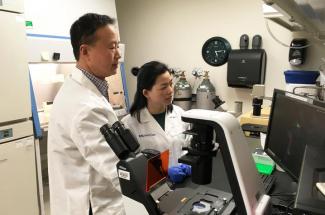Protein Could Offer Therapeutic Target for Breast Cancer Metastasis

A new study by University of Kentucky Markey Cancer Center researchers suggests that targeting a protein known as heat shock protein 47 (Hsp47) could be key for suppressing breast cancer metastasis.
Metastasis is when cancer cells spread from the primary tumor to surrounding tissues and distant organs in the body and is the primary cause for breast cancer mortality. It is estimated that metastasis is responsible for about 90% of breast cancer deaths.
The study, led by Markey researcher Ren Xu, associate professor in the UK College of Medicine’s Department of Pharmacology and Nutritional Sciences, found that Hsp47, a protein that assists with collagen production, plays a role in breast cancer metastasis.
Xu and co-author Gaofeng Xiong analyzed DNA/RNA generated from human breast cancer tissue, which showed that increased production of Hsp47 was linked to metastasis in triple-negative breast cancer. About 10-20% of breast cancers are classified as triple-negative, which is considered to be more aggressive and have a poorer prognosis than other types of breast cancer.
The results suggest that targeting Hsp47 could be a promising strategy to block cancer cell-platelet interaction and cancer colonization in secondary organs for triple-negative breast cancer patients, says Xu.
“If we can find a way to target this pathway with therapeutics we could block this process and therefore inhibit metastasis,” Xu said.
Xu says another benefit of the study is the potential that Hsp47 could serve as a prognosis or biomarker of metastasis since it is often amplified in the genes of metastatic breast cancer tissue.
The study was published in PNAS and was supported by funding from the National Cancer Institute.





